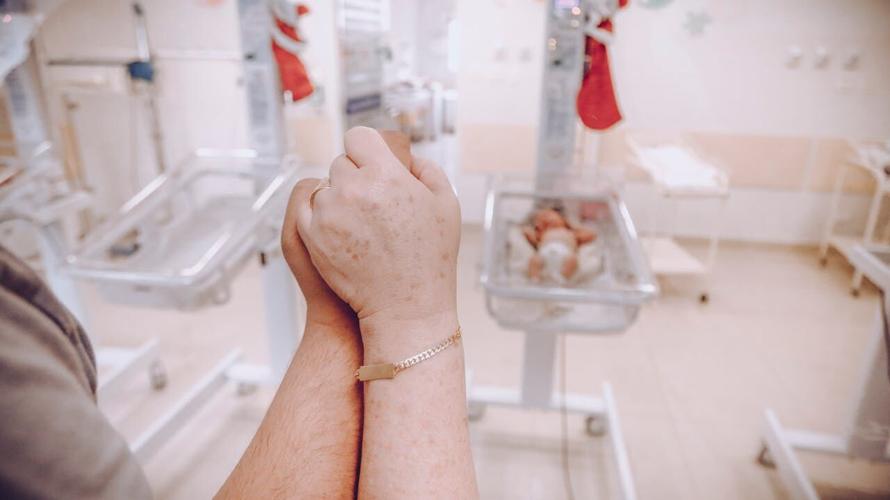
A woman reading a book to a mother and child. (Stanford Medicine via SWNS)
By Stephen Beech
Moms reading "Paddington Bear" to premature babies helps them to thrive, reveals new research.
Hearing the sound of their mother’s voice promotes the development of language pathways in the brains of tots born at least three weeks early, say American scientists.
During the study, hospitalized premature babies regularly heard recordings of their mom reading a chapter of Michael Bond's popular book "Paddington Bear" to them.
MRI brain scans at the end of the study showed that a key language pathway was more mature than that of premature babies in a control group who did not hear the recordings.
Scientists say their research, published by the journal Frontiers in Human Neuroscience, is the first randomized controlled trial of such an intervention in early development.
Lead author Dr. Katherine Travis said, “This is the first causal evidence that a speech experience is contributing to brain development at this very young age.
“This is a potentially transformative way of thinking about how to approach neonatal care for promoting better language outcomes in children born prematurely.”
Premature babies often spend weeks or even months in the hospital, usually going home around their original due dates.

Billy Joachim
While in the hospital, they hear less maternal speech than if they had continued to develop in the womb.
Parents can’t usually stay at the hospital around the clock as they may have older children to care for or jobs they must return to, so premature babies are at risk for language delays.
Scientists have suspected that reduced early-life exposure to the sounds of speech contributes to the problem.
The research team decided to boost the babies' exposure to their mom’s voices while in the hospital.
They did so by playing recordings of the mothers speaking, a total of two hours and 40 minutes a day, for a few weeks at the end of the babies’ hospital stays.
Study co-author Professor Melissa Scala, of Lucile Packard Children’s Hospital in California, said: “Babies were exposed to this intervention for a relatively short time.
“In spite of that, we were seeing very measurable differences in their language tracts.
"It’s powerful that something fairly small seems to make a big difference.”

(Stanford Medicine via SWNS)
She said foetal hearing begins to develop a little more than halfway through pregnancy, around 24 weeks into what is normally a 40-week gestation period.
Late in pregnancy, more sounds, including the mother’s conversations, reach the foetus.
At birth, full-term newborns recognize their mother’s voice and prefer the sounds of their parents’ native language to other languages, previous research has shown.
Those factors suggest that listening to mom's voice contributes to the brain maturing in the latter half of a full-term pregnancy.
Scala said: “The body isn’t going to waste energy developing hearing so early if it’s not doing something important to programme the brain."
The researchers realized that by supplementing the sounds that premature babies hear in the hospital so they resemble what they would have heard in the womb, they had a "unique" opportunity to possibly improve brain development at that stage of life.
The 46 babies in the study were born very prematurely, arriving more than eight weeks early.
Babies could join the study when they were medically stable and had “graduated” from the neonatal intensive care unit, where the sickest newborns receive care, to the intermediate care nursery, where they stay until they are ready to go home.
The babies in the study did not have congenital anomalies and had not experienced major complications at birth.
The researchers recorded mothers reading a chapter of "Paddington Bear", a children’s book that has been translated into many languages.

(Photo by JJ Jordan via Pexels)
Each mom made a recording for her baby in her native language.
The babies were randomly assigned to the treatment group, who heard their mums’ voice recordings, or the control group, who didn't.
The babies in the treatment group listened to the recordings in 10-minute periods, for a total of 160 minutes each night.
By playing the recordings at night, the researchers prevented the parents from knowing which group their babies were in, ensuring that their behavior wouldn’t affect the results.
The researchers said that the recordings did not appear to interfere with babies’ sleep.
The MRI scans included imaging of the arcuate fasciculus tracts on both sides of the brain, which contain large bundles of nerve fibres that help process and understand sound.
The researchers saw a "significant" difference in the white matter in the left arcuate fasciculus, which is specialised for language processing.
They found that the language-processing pathway was more mature in babies in the treatment group than in those in the control group.
The right arcuate fasciculus was less affected by the treatment, which the researchers said is consistent with known differences in how the two hemispheres of the brain process speech.

(Photo by Vidal Balielo Jr. via Pexels)
Dr. Travis, who was at Stanford University School of Medicine when the study was conducted but is now an Assistant Professor at Weill Cornell Medical School, New York, said: "I was surprised by how strong the effect was.
“That we can detect differences in brain development this early suggests what we’re doing in the hospital matters.
"Speech exposure matters for brain development.”
The researchers are planning to test whether the benefits extend to babies with medical complications.
They say parents of premature babies often experience stress during their baby’s time in the hospital, including feelings of helplessness or frustration that they can't spend as much time with their child as they want to.
Scala said, “We’ll always support parents visiting and talking to their babies in person as much as they can."
She also hopes parents will feel encouraged to learn that voice recordings can supplement in-person visits.
Scala added: “This is a way that - even if they can’t be there as much as they want to - the baby is still hearing them and still knows that they’re there.
“And the parents are still contributing to the baby’s brain development.”

























(0) comments
Welcome to the discussion.
Log In
Keep it Clean. Please avoid obscene, vulgar, lewd, racist or sexually-oriented language.
PLEASE TURN OFF YOUR CAPS LOCK.
Don't Threaten. Threats of harming another person will not be tolerated.
Be Truthful. Don't knowingly lie about anyone or anything.
Be Nice. No racism, sexism or any sort of -ism that is degrading to another person.
Be Proactive. Use the 'Report' link on each comment to let us know of abusive posts.
Share with Us. We'd love to hear eyewitness accounts, the history behind an article.